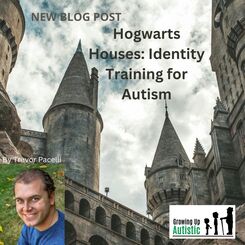 Photo by cant on Unsplash Photo by cant on Unsplash Like other twenty- and thirty-somethings, I grew up watching the Harry Potter series. Every kid around my age was all over the books and movies from grade school through high school. The first movie premiered when I was in third grade, and the last one premiered the summer after I graduated from high school. Each of these eight films was a massive theatrical event, so the series heavily influenced the childhoods of my generation. I believe one of the key reasons the books and movies have been so influential is the way author J.K. Rowling defines the characters, all of which are broken up into four houses at Hogwarts’ School of Witchcraft and Wizardry: Gryffindor, where brave students are sorted into. Hufflepuff, where loyal students are sorted into. Ravenclaw, where intelligent students are sorted into. Slytherin, where power-hungry students are sorted into. In Harry Potter’s first year at Hogwarts, the sorting hat is put on his head, and it struggles to decide where exactly he would be best suited. Although he requests Gryffindor, it’s later revealed that Harry, having almost been killed by the evil Lord Voldemort (a Slytherin) as a baby, still has a piece of Voldemort’s soul inside his body. Thus, Harry would be a better fit for Slytherin. Yet that doesn’t mean he’s not courageous, because he never hesitates to stand up for what he knows is right, even if it means going face-to-face with death more than once. Harry’s not the only one who has personal traits of more than one Hogwarts house. Ron Weasley is a Gryffindor, but also has immense loyalty to his family, like a Hufflepuff. Hermione Granger is a Gryffindor, but also has an encyclopedic knowledge of spells, like a Ravenclaw. Draco Malfoy is a Slytherin, but also isn’t afraid to put his safety in danger to get his way, like a Gryffindor. There are many online quizzes you can take that tell you which Hogwarts house you would best fit into. But playing this game for you or a friend doesn’t have to be done by a questionnaire. You could simply observe someone and take note of their actions and personality. That brings me to my main point: Fantasy worlds and special interests can help those on the autism spectrum. Here’s what I mean. Most people in a casual setting can pretty easily know the unspoken signs of another’s personality by watching them. They don’t need the personality traits spelled out for them—reading the room is second nature. People with autism don’t usually have that. They can’t tell what another person’s intentions or thoughts are simply by watching them; they need to be told directly if someone is being disrespectful or manipulative. Someone on the autism spectrum might not relate to other people very well, but they can relate to their special interest extraordinarily well. This can include any fictional fantasy world with a fanbase, such as Star Wars, Pokémon, The Lord of the Rings, or Harry Potter. The latter of these examples can help with the use of the four Hogwarts houses. Somebody with autism could take on the task of figuring out which Hogwarts house they think a friend or family member would best belong in. It could turn into a fun game of detective work where the person with autism has to carefully think about the other person to decide whether they have more traits of a Gryffindor, Hufflepuff, Ravenclaw, or Slytherin. This in turn could encourage social interaction between that autistic person and the one they’re trying to place in a house. While using others for your own game could sound questionable, it may be the best motivation for autistic people to think more about what others are like. I suffer from anxiety, so I’m not a Gryffindor. I couldn’t manipulate people even if I tried, and I’m relatively content with where I am in life, so I’m not a Slytherin either. However, I do have hints of Hufflepuff because I’ve proven myself to be a hard and loyal worker. Yet because I’m dependent on my creative mind in work and in hobbies, I’m the best fit for Ravenclaw. In thinking of others, I know a church pastor who has been immensely courageous amidst the challenges he’s faced, and while he has book smarts, he’s mostly motivated by community-building and his family. Thus, he seems to be the best fit for Hufflepuff. That’s just an example of how using something an autistic person is already interested in can help develop an interest and understanding in people. But full disclaimer: This is no means to an end in getting to know people. It’s unhealthy to get overly caught up in your fantasy, especially when trying to force others into your own imagination. The exercise I described can be a great motivator, but deciding whether a friend or family member would be best for Gryffindor or Slytherin is not a permanent solution to overcoming personality blindness. When learning about one another, nothing can replace simple conversation. While there can be ways to get there based on the individual’s current strengths, human interaction with one another should always be the end goal. Trevor Pacelli is the author of Six-Word Lessons on Growing Up Autistic, What Movies Can Teach Us About Disabilities and other books on Amazon.
0 Comments
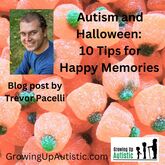 By Trevor Pacelli So many people of all ages love Halloween, yet this time of year could also really upset someone on the autism spectrum. Therefore, here are some essential tips that can help anyone with or without autism enjoy this spooky time of year despite the limitations: 1. Prepare for the Scares Kids with autism have many hyper-sensitivities, and since Halloween is the season of sending chills, an autistic child could turn queasier than usual at the sight of blood, even fake blood. For instance, they might strongly hesitate to step inside a costume shop full of ghoulish lawn decorations. It’s important that a parent is there to be on the lookout for such distressing decorations and guide their kid’s eyes the other way whenever possible. 2. Jack-o-Lanterns and Scarecrows are Fun Sensory-Friendly Activities! While growing up, my sister and I bought our own pumpkins, drew faces on them, and our dad used a small saw to cut the lines for the faces. Then we put our jack-o-lanterns on the porch right next to the scarecrow we made from clothes full of crumbled-up newspaper with a fabric sheet wrapped around a soccer ball for the head. The saw can be awfully loud, but the child doesn’t have to be in the room while it’s on, and simply cutting into the pumpkin with a knife will get the job done too! 3. Special Interests Can Inspire Costume Ideas I have fond childhood memories of preparing my Halloween costumes with my mom. One year, she helped me make a costume based on a superhero character I created. Another year, she bought used clothes to cut up, paint over, and distress so I could dress up as Two-Face from Batman. These were fun projects for my mom and me to bond over, and they were inspired directly by whatever I was interested in at the time. 4. My Costume Hurts! Autistic people often are hypersensitive to certain clothing materials or smells, and that can include the distinct latex odor of a rubber mask. These costumes would be no fun for kids on the spectrum to wear and at times can even be painful. So, parents should think twice about encouraging their child to wear a certain costume just because it would look “so cute.” If the costume is causing them pain, then the Halloween season will be no fun for them at all. 5. Trick-or-Treating Together Most kids go trick-or-treating in groups every year, yet a child with autism, who often struggles to make friends, might have nobody to spend the evening with besides Mom, Dad, or an older sibling. This can make Halloween a lonely time of year, and it can break the hearts of parents to watch their child go trick-or-treating alone. One solution might be to arrange a meetup with family friends who have kids around the same age as the autistic child. 6. Overstimulation Around the Houses A kid with autism could hate houses with flashing light patterns or loud sound effects, which could make them even less likely to say, “trick or treat.” A quick way for the autistic child’s parents to explain why their kid won’t make eye contact is to show the questioning parents a small card that explains the kid’s sensitivities. However, it’s not advisable to give that child an “autism” badge or make them carry a blue jack-o-lantern bucket because that could lead to bullying. 7. Will Stranger Danger be a Problem? Probably not. The kids will be surrounded by plenty of other adults also chaperoning their little trick-or-treaters, and most parents in neighborhoods are friendly. Also, the stories of kids being killed or injured by razor blades hidden in candy are mostly just myths. Any accounts of Halloween candy being tampered with are few, and hardly anything to stress about. 8. Sometimes the Child Would Rather Stay Home I personally loved dressing up and getting free candy, but when my work on the streets was done for the night, my mom handed the door-answering duties over to me. It was more fun for me to see the costumes worn by the other kids, some of whom were from my class. This could be more comfortable for a kid with autism—no costume to wear, no flashy lawn decorations to look at, no cold weather to walk through, and the only eye contact that needs to be made is with other kids. 9. Know the Limits of Candy I struggled in the past with just how much food was too much since I lacked the judgment of portion sizes that others had. Kids on the autism spectrum could be the same way, where they don’t know how much candy in one sitting is too much. While any kid would want to eat as much as they can in one sitting, they usually know by instinct when to stop. Yet by the time an autistic child has registered that they’ve had enough candy, they’ve already eaten twenty candy bars. 10. The Child Must Know When to Stop Trick-or-Treating I was twelve when I last trick-or-treated, which I’d say is an appropriate age to stop. While there are many things in life you shouldn’t feel ashamed of never outgrowing, trick-or-treating isn’t one of them. Autistic kids can lack common sense about whether they’re too old to enjoy something. In my experience, I was still watching preschooler TV shows when I was in third grade, and needed to be told what those shows’ target audience was. I hope these tips help your child with autism create as many happy memories of Halloween and trick-or-treating as I have. Trevor is an adult with autism and is the author of Six-Word Lessons on Growing Up Autistic and What Movies Can Teach Us About Disabilities. 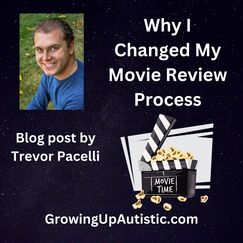 When I was in college back in 2014, I created my movie review blog, TrevorsViewOnHollywood.com, because I found during that time how much I enjoyed talking about movies. So whenever I went to see a new movie, I wrote a review on it and posted it on my blog. At that time, it all seemed to be going fine as a hobby, as there was some generally good feedback about it from friends and relatives. Then when I left college, I started working for my parents’ company, Consetta Group, where they worked with me to develop my own personal businesses, which included my movie reviews. I started to get more serious about it and tried monetizing it further, posting a new review every Friday, which likewise meant seeing a new movie in theaters every week. It was pretty exhausting, especially when I had to see movies I otherwise would never have wanted to see, but this format of reviewing movies motivated me to construct my own elaborate system for grading movies that I continued to perfect and master over the next several years. It helped me improve my ability to assess whether a movie was well-made or not. During this time, I was also heavily dedicated to following the Oscars, which included making predictions each year as to what would be nominated. I kept this up by posting a new review for a new release every Friday even after I left Consetta Group, and for a while, this all seemed quite effective. But then COVID-19 hit. Movie theaters closed. I couldn’t post a review for a new weekly release anymore. At first, I decided to review older classic films, with some direct-to-streaming releases mixed in, but as the months passed with movie theaters still being closed, I was losing my drive to review movies. Even when the vaccine became available, movie theaters opened back up, and life slowly went back to normal, my old passion for reviewing movies was gone. It started to feel like a chore to have to keep up my commitment to posting a new review week after week, and I hated having to sit through the big popular movies that I already knew going in were going to be bad. It didn’t help either that I was losing my respect for the Academy of Motion Pictures. I knew already that they nominated films based on campaigns and not based on filmmaking quality, but leading up to the 2022 ceremony, they were making horrifically insulting decisions to try and bring viewers back. Their decision to remove several of the categories from the live show was the straw that broke my camel’s back; I officially decided that for the first time in six years, I was going to boycott the ceremony. Upon looking back, I made the right decision. So that was one more step forward to dropping this hobby that was no longer fun for me. Yet here’s another thing: having to talk about badly-made movies affected my optimism outside of the hobby. My big “come to Jesus” moment was when I shared a pretty tasteless joke on Facebook about the Depp vs. Heard trial and was called out for it, which convicted me of how writing constant negative reviews for the popular movies was damaging my optimism throughout the day. So I gave it up. I never again posted on my blog. No longer did I feel pressured to see all the new Marvel movies or Disney live-action remakes. No longer did I have to bring a notepad into a movie theater and struggle to see what I was writing in the dark. I was free to watch what I wanted when I wanted. I was free to watch nostalgic guilty pleasures of mine, such as the 2002 Scooby-Doo movie, or older movies I was interested in checking out, such as Bedknobs and Broomsticks. I’m also free now to go to the movie theater on my own terms and watch movies I want to see. So out of my own free will, I saw both M3GAN and The Super Mario Bros. Movie; although neither was what I would consider “good,” I had a fun time with both of them. Then during the week of “Barbenheimer,” I decided to go see both Barbie and Oppenheimer. While I hated sitting through Oppenheimer, I was pleasantly surprised by Barbie. So it was worth joining in on the popularity bandwagon this one time so I could then join in on a conversation I wanted to be a part of. I am currently writing mini-reviews of movies I have seen in the past, and categorizing them to make it easy for people to find something to watch for fun, or other moods. They can be found on Instagram and on our Pacelli Publishing website. Overall, I can’t even imagine going back to my commitment of reviewing one new movie a week on an elaborate grading scale. I’m much happier this way. To learn about movies that depict disabilities, check out my book, What Movies Can Teach Us About Disabilities. 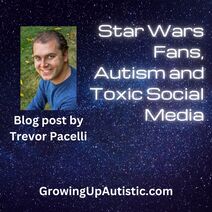 The Star Wars fanbase is an extremely passionate bunch, with strong opinions of all extremes. I have learned much about myself and my relationship with social media because of my interactions with this fanbase. I hope my experience as a young adult with autism and avid movie buff will help others navigate some of the ups and downs of social media. Of the Star Wars franchise, I really love watching the original trilogy, the first two seasons of The Mandalorian, and two out of three films from the sequel trilogy. Now, I’m with everyone else who agrees that the last of that trilogy, The Rise of Skywalker, is hot garbage, yet a vocal majority of Star Wars fans also say the same about the other two sequel trilogy movies that I love: The Force Awakens and The Last Jedi, even saying they’re worse than any movie from the prequel trilogy. Whenever a Star Wars-based social media account posts anything even remotely related to the sequel trilogy, the comment thread is always toxic with hatred for all three of those movies. It presses my need to make my own opinion heard: I believe the first two movies from that trilogy are really good, even better than the entire original trilogy. I realize that putting this opinion out there only starts trouble, as these types of internet trolls are always happy to start fights with anyone who disagrees with them. Yet I just can’t stay away from voicing what I see as the truth, especially with a fanbase as toxic as the one for Star Wars, and I feel an overwhelming need to knock some sense into the idiots in that community, or put them in a position for me to report them and watch them get punished. You can follow this link to read more of my thoughts about all the Star Wars movies that I believe are worth your time to watch. This type of interaction is also tied to my anxiety: I’m afraid that no matter what my opinion may be, I'm always wrong. It doesn’t matter whether my opinion clashes with a child, a Harvard professor, or a jobless troll on the internet, I always doubt my own judgment. Often, when an internet user resorts to throwing insults, I take it a lot more personally than others do; I wonder if what they said to me is true. One time, someone on the internet called me a creepy middle-aged man (even though I'm 30) and it made me wonder if I really am creepy because I enjoy certain media primarily made for kids. Yet as much as I dislike engaging in online fights, I feel the need to do so in order to convince myself that the other is wrong. This addiction has prompted the decision for me to leave Twitter and Facebook. Looking back, I don’t miss those platforms one bit. So how then can others on the autism spectrum navigate a toxic world, especially when online, the place where much of our lives happens nowadays? Well, first off, it’s the duty of a parent to survey their child's internet activity like a hawk. Anyone can get in a lot of trouble online, and not just the illegal kind or the "revealing too much personal information" kind. The internet is full of a lot of scummy people, and the online setting seems to bring out everyone’s worst traits. The anonymity of comments makes spiraling down that rabbit hole of toxicity way too easy. Everyone needs to understand that social media bickering doesn’t do anyone any good. There will never be a winner, only two losers. Unfortunately, social media is much more attractive to kids on the autism spectrum since they don’t have to struggle to read facial cues. I for one am a slow processor when thinking of words to say verbally, and I often get lonely, so I have resorted to starting conflicts with strangers on social media to at least have some form of communication. That’s why I encourage involvement in social clubs and volunteer groups for more chances to meet with people face-to-face, something that we all need, autistic or not. However, because some fans’ hatred of certain Star Wars movies is not fully possible to avoid, and for reasons I’m still working on, I have clung to the fear that I should feel ashamed for loving The Force Awakens and The Last Jedi. I have found that I need to constantly remind myself of the great things done well in those movies. Despite my autism, it’s possible for me to find confidence in my own judgment, and you can do the same if you are on the spectrum. If your lack of confidence in your opinion is causing you genuine stress, then it’s time to shove aside whoever’s saying the opposite opinion. That may mean you have to leave social media, but you should do whatever you need to ignore the opposing argument and remind yourself of why you have the stand you’ve taken. I understand that this is not the familiar “be open to other people’s points-of-view” message, but if someone else’s point-of-view is causing you low self-confidence and diminished mental health, then that’s the time to shut off your ears to the other side. You can see my movie recommendations on our Pacelli Publishing website, and check out my book, What Movies Can Teach Us About Disabilities, which includes a chapter about how autism is portrayed in the movies. Honest thoughts from 30-year-old Trevor Pacelli, adult with autism and author of What Movies Can Teach Us About Disabilities, Six-Word Lessons on Growing Up Autistic, and illustrator of The Kindergarten Adventures of Amazing Grace. See all of his books at TrevorPacelli.com I don’t want to be known as somebody with autism, I don‘t want to be known as autistic, I want to be known as just Trevor. Despite the "disability pride" stuff I see everywhere, I'm among the minority who hates my autism and wishes there was a cure; while my heavily organized mind and wild imagination are great bonuses, I would give that all up in a heartbeat to enjoy relationships the same as everybody else. Social Anxiety My anxiety most kicks in during social situations, even little ones like sudden small talk. If I pass by a stranger on a street and s/he says to me, "hi," I internally freak out because then I must abruptly transition out of my mind to say words. Part of that could come from stressful interactions I’ve had in trying to talk with people who have foreign accents and don’t speak English too well, it’s harder for me to understand them, and it only got harder during the COVID-19 mask mandate. It's equally as hard for me to look the other in the eye while I’m talking to them because knowing that they’re staring into my soul as I speak builds up inner pressure akin to that of stage fright. It makes sense for me that I have this problem considering my speech delay—while an idea may float around in my head, it takes longer for my tongue to adapt that image into words. My speech pattern mostly involves me pausing to come up with the right word until the other person just finishes my sentence for me, and when telling a story, the events would usually be told out of sequence. So if a stranger approached me for directions, I often say, "Sorry, I can’t help you" because of my incapacity to put my thoughts into words or even remember street names. Lately, my anxiety attacks have gotten to the point where I get one for no apparent reason and become physically unable to speak. One time, I retreated into the bathroom away from the social group I was in, and for around a half hour I fought against myself to walk back out—just reaching for the doorknob felt impossible because some invisible force kept pushing me back. Stimming The Merriam-Webster Dictionary definition of stimming: "Behavior that is marked by a repetitive action or movement of the body (such as repeatedly tapping on objects or the ears, snapping the fingers, blinking the eyes, rocking from side to side, or grunting) and is typically associated with certain conditions (such as autism spectrum disorder)." Usually, people who stim are unaware of their behavior unless someone else points it out to them, and I’m no exception as I do it constantly throughout the day. I may knock my knee, rock forward and back, wrap the hoodie string of my sweatshirt around my fingers, tear apart napkins and used coffee cups, repeat phrases to myself out loud, or flap my hands. The stims happen most often during the ever-so common event when a painful memory pops up in my head, and I make some random unexplainable lip and hand gestures to fight off the mental pain. You can imagine how I would always have difficulty sitting still or doing other things that require stillness, such as praying. Sensory Issues Besides talking, my autism also affects my sleep, to the point when a night of a full seven or eight hours of sleep is an extreme rarity. Often, if I'm on vacation, it takes hours to fall asleep, and I then wake up hours before the sun rises, especially if I have to sleep on the couch. It’s one of the reasons why travel is so anxiety-inducing for me; among the other reasons include the change in routine, weather, and time zone, not to mention being around people for hours on end. Camp was worse though; while vacations can be planned right down to the bathroom breaks, at camp, everything’s designed to be spontaneous. For the most part, camp leaders seldom ever tell the campers what to expect each day; one time, I along with the other boys were forced without warning to spend the whole night sleeping outside in a tent in the snow. It was supposed to be a lesson about the challenges we must take on as men, but I just kept panicking about how cold and numb I was and wanted so desperately to go home. Camp also forced us to stay up late and wake up early, and the games were all very physical and loud. Plus, the faraway locations of the camps often had extreme temperatures, and the buses transporting us always broke down, causing us to arrive many hours later than originally planned. (One time, the snow conditions were so bad that we had to stay at our campsite a full extra day as we waited for buses to arrive and drive us home.) So since most kids with autism find so much security in routine and predictability, a camp could be counterproductive to helping them grow. Special Interests I had several special interests growing up, some of which I’m not proud of for being transfixed onto. Those included:
As for Pokémon, did you know that its founder, Satoshi Tajiri, could be autistic? It would make sense because the series’ concept of exploring a fantasy world that one could customize with their team of cute little creatures has a lot of appeal to kids on the spectrum (and adults on the spectrum at that). Yet the franchise has been so near and dear to me after all this time mostly because I love to design my own Pokémon. That itself is an entire branch of fans in the Pokémon fandom, known as the “Fakémon” community, which furthermore gives me a sense of belonging somewhere. So I now run my own Fakémon Instagram account: @murro_region. High School Every time the teacher from any of my classes told the students to form groups for a project, I was that student who needed to have my team picked for me because everyone else already made their picks with their closest friends. When breaking into groups of two, I always ended up in a group of three, had to work with the teacher, or had to do the project by myself. This happened even if I had others from my social clique in my class who called me their friend. They would always save seats in advance for their much closer friends, and I would ask, "so where am I supposed to sit?" and they would then tell me, "you can sit anywhere you like." This meant I never got the privilege of getting to sit close to the ones whom I most wanted to develop friendships with, inside or outside the classroom. These "friends" of mind didn’t even care if their shoving me aside meant I had to eat at a table by myself, as long as they got to sit with their own closest friends. After school would end, and I was talking with them in the hallway, they would often say to me, "We’re going to go hang out somewhere now. See ya!" I never got an invitation to join in, even though I had the time to do so. Although they told me they appreciated me and valued me and considered me a good friend, their actions instead gave me the impression that they secretly preferred if I wasn’t around, and were just politely tolerating my presence. High school was made up entirely of me watching the other kids from my social clique become the center of many running jokes, but a running joke (or even a standalone joke) about me was never made. At the time, Facebook was at its most popular, meaning my high school experience was made all the worse by the photos of them all having fun together without me, which gave me a horrible case of FOMO (fear of missing out). School dances were the worst part of it because no girl ever wanted to be my homecoming date, and no girl ever asked me to any of the tolo dances. Although I did find a date to my senior prom and did join a group, the shoving aside of me only continued, as while they all got to carpool together, my date and I were by ourselves in my car. Then my date had to leave the dance early, so I was alone on the car ride back. Looking back, I wonder if it was a waste of time and money for me to go to my prom and if I was better off staying home. However, I will admit I had a few toxic traits back then. I was so depressed more days than not, and I resorted to spreading my bad mood to everyone else, in hopes that they’ll show me pity and ask me what was wrong. Stuff like that humbles me and makes me think, "no wonder nobody wanted me around!" Not that it excuses their treatment of me, because to this day I still consider high school to be the worst years of my life; had it not been for my Christian faith, I would have killed myself at some point during that time. It's Better Now! Yet later in my adult life, once I began to take daily medication, I saw an enormous improvement in my well-being. Perhaps the most therapeutic thing for me has been living with a pet, seeing how I was so close with the family cat as I grew up. Four years after the cat passed away, I decided it was time for me to get a pet of my own as a source of self-therapy. Now, I am the proud dog father of an adorable little terrier-mix, and since then, my suicidal thoughts and deep pits of depression have been almost nonexistent. Greater still, my quality of friendships has improved. I found friends at my local church who put in their best effort to accept me for who I am and treat me as an equal. They know me as the food, movies, and pun guy, and always refer to me when they want to know my opinion about a movie or hear about a weird combo of foods that they think sounds like something I would try to make. Once, one of them even sent a text message with a pun to one of the others, and the other responded, "Haha, you just pulled a Trevor!" That in particular meant a lot to me because it was a sign of me finally gaining the acceptance in friendship I’ve wanted and needed since high school. So while I prefer if I wasn’t autistic, and it will always provide challenges for me until the day I die, the fact that progress has been made is a testament to readers like you about the humanity of anyone with a disability. In terms of interacting with people like me, here are some things to know: Talking to Others with Autism Don’t:
Learn more about Trevor at TrevorPacelli.com
 Photo by Unsplash.com Photo by Unsplash.com Guest post by Erica Francis Painting, dancing, and music are some ways your child with autism can express themselves creatively. Having a creative outlet helps them reduce their anxiety and escape their worries. Check out the creative outlets below: Painting Encourage your little one to paint. Give them a palette with different colors and brushes of different thicknesses and let your child go to town. Autism Parenting notes that painting can allow your child to express themselves, even if they aren't verbal, and it may help build confidence. Music Whether you're encouraging your child to listen to music, play an instrument, or sing, it could benefit them. When listening to music, the right and left hemispheres of the brain are stimulated. Professionals use music as part of autism therapy for this reason. In fact, Percussion Play points out that music can improve language development as well as cognitive function. Try using a drum or rhythm sticks. Take turns developing patterns and repeating each other's rhythm. Dancing Dance therapy helps to reestablish the body-to-mind connection. Dance improves concentration and attention and helps children express themselves, even if they're nonverbal. In a group setting, dance can help build social skills. The repetition of dance moves enhances memory. Give them an opportunity to create a dance and demonstrate it to you, which is also a good time to spend more time with them and show you care. No matter how busy you may be with raising your child on the spectrum, carving out time to share artistic experiences pays huge dividends both now and into the future. Try playing Night at the Museum, where one person is the museum guard and turns their back on the others, who must dance or move in some way until the guard turns back around. The aim of the game is to not get caught moving when the guard turns around. Give Your Child an Art Room If you have an unused room in your home, consider dedicating it as an art or crafting room. whether it's a den, a spare bedroom, or your unfinished or finished basement. Add a variety of supplies into the room, such as markers, rhythm sticks, paints, crayons, and more. Organize the supplies so your child can easily reach them. General Rule with Art for Autistic Children If you're creating activities, remember to adapt them to your child based on their skill and condition. Art shouldn't be frustrating for a child. When you notice them struggling, it's okay to accommodate them. Create both open-ended and closed-ended projects. Open-ended art projects allow children to express themselves and get creative. On the other hand, closed-ended assignments help them follow instructions and build specific skills. |
Inspiration for Life with AutismThis blog has a variety of articles about people living life with autism, and topics and ideas that can help in the journey. Guest bloggers are welcome. Inspired by Trevor, a young adult film critic, photographer and college graduate on the autism spectrum. Categories
All
Archives
July 2024
|
Proudly powered by Weebly
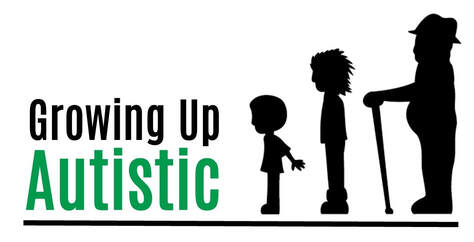
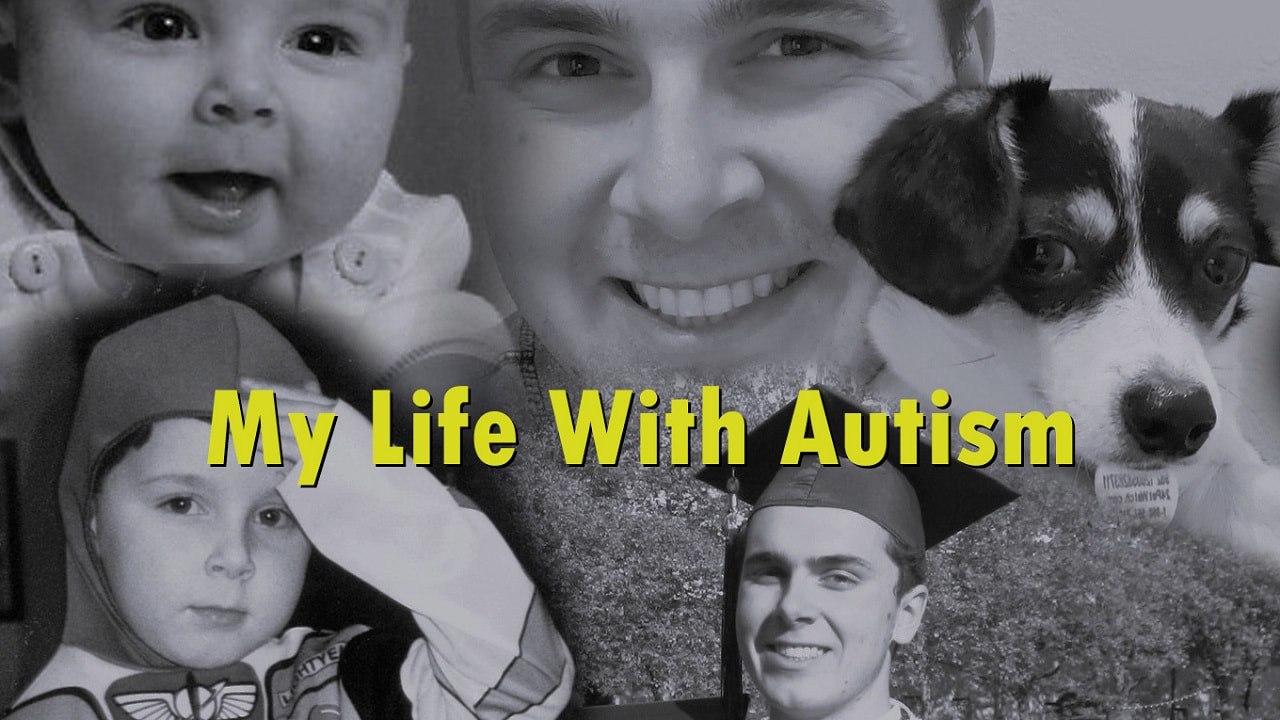
 RSS Feed
RSS Feed